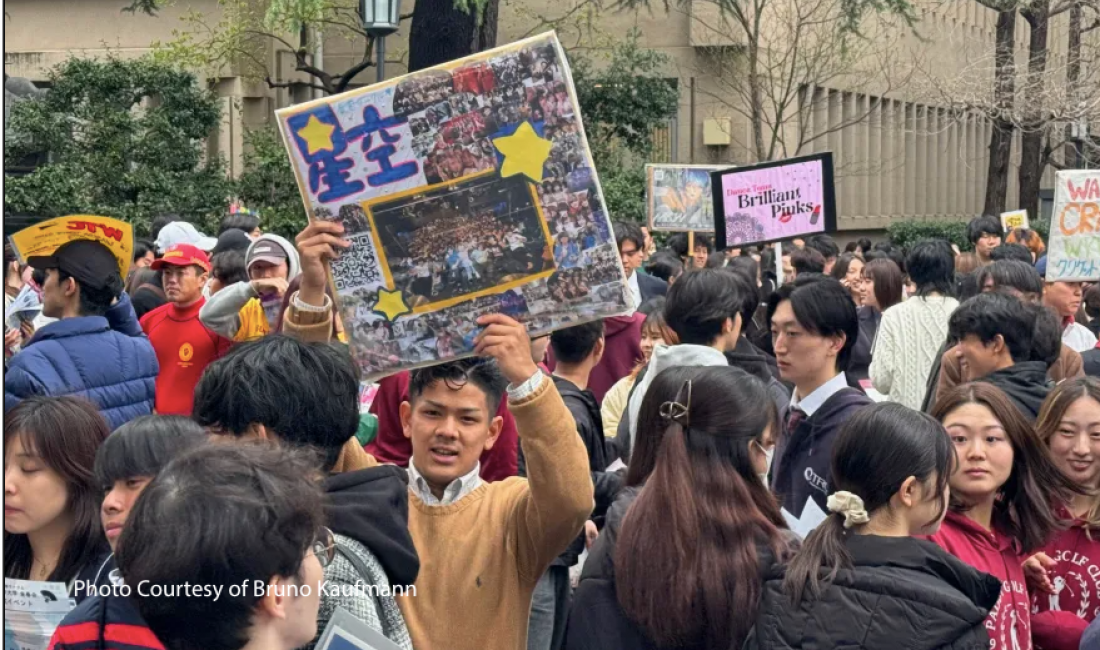And the Democratic Leadership of a Female Mayor in Tokyo
This story was originally produced for and published by swissinfo
Every spring, as cherry blossoms explode across Tokyo, the campus of the prestigious Waseda University bursts into life. During the first week of term, senior students transform the sprawling campus grounds into a bustling fairground, pitching everything from stand-up comedy, aikido and jazz jams to philosophical tea clubs, queer groups and communist study circles to more than 10,000 incoming students.
“I have been involved in a political club since my very first day here,” says 22-year-old Kentaro Kikuchi, a fourth-year political science student. We are sitting in Professor Airo Hino’s office on the 12th floor of the university’s main building while Kikuchi and his fellow student, 23-year-old Yuta Suzuki, join us via video call. “We are gearing up for the next parliamentary elections and are discussing what really matters in digital voting aids,” Hino says.
At the end of July, half of Japan’s Sangiin, the 248-member upper house of the national parliament, is up for re-election. For decades, Hino and his students have teamed up to support interested stakeholders in developing the “smartvote” platform, known locally as Vote Match. Ahead of every election, the team analyses party platforms and candidate statements to craft a set of key questions voters are eager to have answers to. Such digital voting aids are usually hosted by media outlets like the daily newspaper Yomiuri.
Prior to every election, Hino and his team identify key information sources on which to base their questionnaire. “We look at party platforms and electoral promises made by both parties and individual candidates, and analyse newspaper articles and social media posts,” Hino explains.
Suzuki is happy to see that mainly young voters are using the tool. Like Kikuchi, he completed an internship with a politician during his university years. “I realised how important it is for a democracy that people are well informed and make conscious decisions,” Suzuki says. “Vote Match-style apps on a smartphone enable people who don’t follow political discussions on a daily basis to still form a political opinion,” he adds.
Like in many other established democracies, voter turnout in Japan varies significantly between younger and older citizens. In the last national elections for Japan’s lower house, nearly two-thirds of voters over 70 went to the polls, while turnout among the under-30s barely topped one-third.
But change may be underway, especially among first-time voters. A study by Japan’s Ministry of Internal AffairsExternal link found that, after the voting age was lowered from 20 to 18 and online voting tools became more widely available, over half of 18-year-olds participated in the last national elections.
Only 2% of Japanese municipalities are headed by women
A fresh breeze of change can also be felt at the local level. In Suginami, a city of 583,000 people, voters recently elected a female mayor for the first time, and women now hold half of the 48 seats on the city council. “During my election campaign, I particularly reached out to young people via social media,” says its mayor, Satoko Kishimoto.
“Japanese politics is dominated by older men,” she adds. Kishimoto is one of just 35 female mayors of Japan’s more than 1,700 municipalities. At 50, she is well below the average age of top local politicians, which stands at 67. For next year’s elections in Suginami, Kishimoto wants to launch a local online voting platform. “This will help us to focus on political content,” she says. “That’s more important than focussing on personalities and parties.”
With support from experts like Hino’s team at Waseda University and others across the country, local, regional and national media outlets now offer a variety of online voting tools ahead of every election. “This allows us to compare the strengths and weaknesses of the various applications,” says Swiss national Uwe Serdült, head of the Digital Governance System Lab in Osaka, roughly 500 kilometres south of Tokyo.
Serdült’s labExternal link, launched just a year ago, is a collaboration between Japan’s Ritsumeikan University and the Centre for Democracy Studies at the University of Zurich. “We research how online voting tools can be made more efficient, transparent and less susceptible to political bias,” says Serdült. “The current methods for identifying relevant political positions of candidates and political parties are laborious and opaque, which undermines public trust in such tools.” At the Digital Governance Lab, methods are currently being developed to make selecting the questions for online voting tools more understandable and transparent.
Experts like Hino and Serdült believe that Japan’s stable multi-party democracy and frequent elections make it an ideal environment for the use, analysis and development of digital tools for civic participation. These include not only smartvote-style platforms but also petitions and citizens’ initiatives. Suginami’s mayor, Kishimoto, is particularly interested in the latter. “Like in Switzerland, I want the people in my town to engage more with political decisions and take greater responsibility for their outcomes,” she says.
Edited by Mark Livingston. Adapted from German by Billi Bierling/gw




